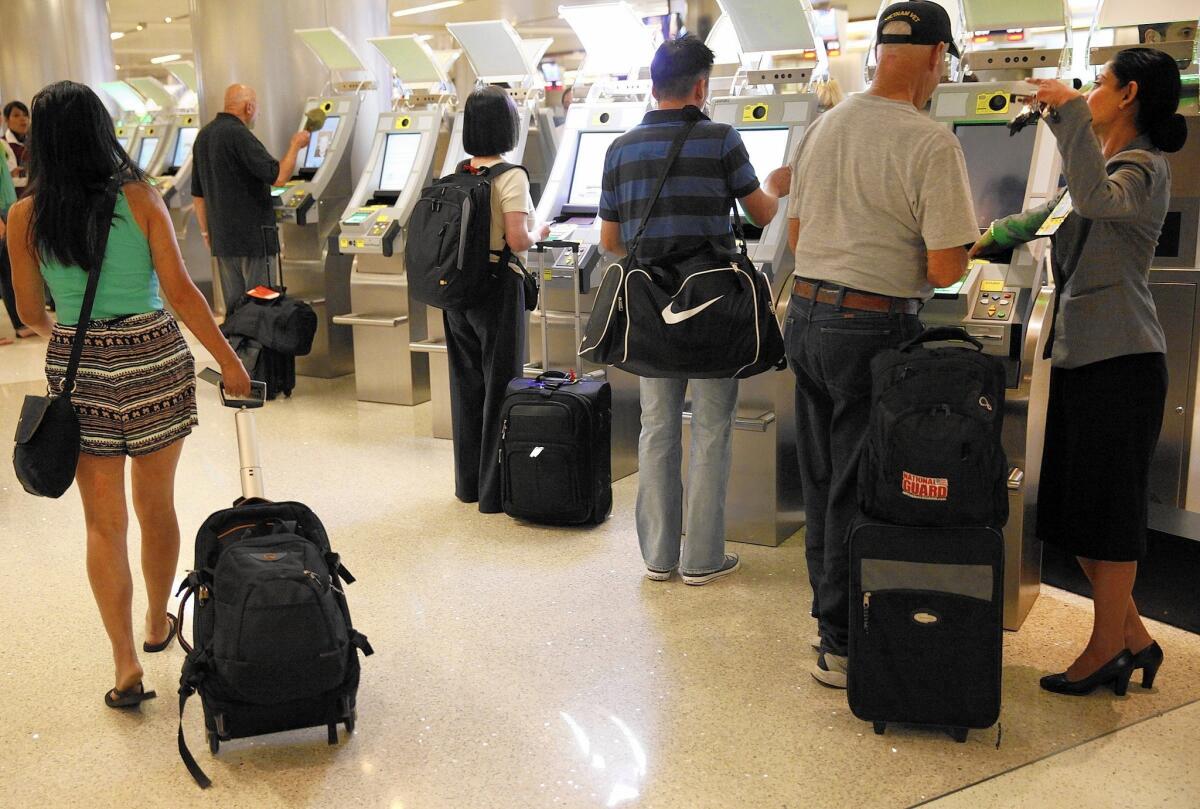ACLU argues the U.S. is dragging its feet on why people are on that ‘no-fly’ list

Passengers whose names show up on “no-fly” lists have been unable to get answers on why they were included.
- Share via
Reporting from PORTLAND, Ore. — In a case that could help demystify how the FBI deems somebody a terrorist threat, the American Civil Liberties Union argued in federal court Wednesday that the government has failed to comply with an earlier court order to tell people how they wound up on the “no-fly” list.
The case revolves around several Muslim Americans who say they were included on the list unfairly and denied a constitutional right to find out why. The government argues that explaining the process in open court would endanger national security.
At a time when Republican presidential race front-runner Donald Trump calls for broad monitoring of Muslim immigrants, the case is being closely watched by both civil liberties advocates and those who say the government must do more to prevent terrorism.
NEWSLETTER: Get the day’s top headlines from Times Editor Davan Maharaj >>
The lawsuit was originally filed in 2010 on behalf of 13 U.S. citizens who learned that they were on the list only after trying to board airplanes at U.S. airports. None had been charged or convicted of a violent crime. One was an Air Force veteran. Another had studied in Saudi Arabia.
U.S. District Judge Anna Brown gave them a minor victory last year when she ordered the government to come up with a better system for telling people they were on the list and, if possible, why.
The government responded by creating a process to notify people placed on the list and, in limited cases, telling them the reasons.
But back in court Wednesday, ACLU attorneys argued that the effort fell short and that, in its quest for secrecy, the government was continuing to violate the right to due process.
Hina Shamsi, an attorney for the civil liberties group, said the government’s case was “essentially an argument that the sky would fall.”
She noted that six of the original 13 plaintiffs had been taken off the list. “They’ve been moving on with their lives. The sky did not fall.”
The plaintiffs, though, have suffered damage to their businesses and personal lives, she said.
“This is an age when the terrorist [accusation] is the most significant one that the government can label someone,” Shamsi said.
In a brief defending the government, U.S. Atty. Brigham Bowen wrote that the government had not erred simply because somebody included on the list “never successfully commits a terrorist act.”
“Rather, the task imposed by statute is to identify persons who may pose threats and deny them access to civilian aircraft and the means to carry out mass-casualty attacks,” he wrote.
In court, Bowen argued that the government had no obligation to tell people why they were placed on the list.
“Government is not required in name of due process to put its national security at risk,” he said. “The plaintiffs’ interest must necessarily give way.”
Created after the Sept. 11, 2001, terrorist attacks, the no-fly list contains thousands of names. It is shared with U.S. allies and ship captains.
The list, one of the government’s most public counter-terrorism tools, has also been one of the most condemned, with critics saying some innocent travelers have been mistaken for terrorism suspects.
The FBI’s Terrorist Screening Center, which operates the list, won’t reveal the evidence against those on the list, allow them to question witnesses or challenge the findings in court.
As President Obama pointed out in an Oval Office address this week, people on the list are not necessarily barred from owning firearms. He would like to change that.
“What could possibly be the argument for allowing a terrorist suspect to buy a semiautomatic weapon?” Obama said. “This is a matter of national security.”
Twitter: @nigelduara
ALSO
Affirmative action at universities in doubt as U.S. Supreme Court hears arguments
A century ago, a popular Missouri newspaper demonized a religious minority: Catholics
Middle-class families, pillar of the American dream, are no longer in the majority, study finds
More to Read
Sign up for Essential California
The most important California stories and recommendations in your inbox every morning.
You may occasionally receive promotional content from the Los Angeles Times.











